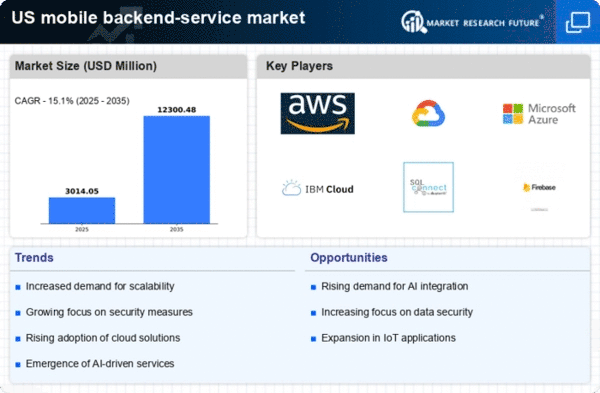Emergence of IoT Applications
The mobile backend-service market is significantly influenced by the emergence of Internet of Things (IoT) applications, which require robust backend support for data management and processing. As IoT devices proliferate, the demand for backend services that can handle vast amounts of data in real-time becomes increasingly critical. In 2025, the IoT market in the US is projected to exceed $1 trillion, creating substantial opportunities for the mobile backend-service market. This growth necessitates the development of specialized backend solutions that can efficiently manage device connectivity, data storage, and analytics. Consequently, service providers are compelled to innovate and enhance their offerings to cater to the unique requirements of IoT applications, thereby driving growth within the mobile backend-service market.
Increased Focus on User Experience
The mobile backend-service market is experiencing a heightened focus on user experience, which is becoming a key differentiator for mobile applications. As competition intensifies, businesses recognize that delivering seamless and engaging user experiences is essential for customer retention and satisfaction. In 2025, studies indicate that 70% of users abandon applications due to poor performance, underscoring the importance of efficient backend services. The mobile backend-service market plays a crucial role in ensuring that applications perform optimally, with minimal latency and downtime. By investing in backend solutions that prioritize user experience, companies can enhance their application performance, leading to increased user engagement and loyalty. This trend is likely to drive further innovation and investment in the mobile backend-service market.
Growing Importance of Data Analytics
The mobile backend-service market is increasingly shaped by the growing importance of data analytics, as businesses seek to leverage data-driven insights for strategic decision-making. The ability to collect, analyze, and act on data in real-time is becoming essential for organizations aiming to stay competitive. In 2025, the data analytics market in the US is projected to reach $200 billion, highlighting the critical role of analytics in business operations. The mobile backend-service market is at the forefront of this trend, providing the necessary infrastructure to support data collection and analysis. By integrating advanced analytics capabilities into backend services, companies can gain valuable insights into user behavior and application performance, ultimately driving growth and innovation within the mobile backend-service market.
Rising Demand for Mobile Applications
The mobile backend-service market experiences a notable surge in demand driven by the increasing proliferation of mobile applications across various sectors. As businesses strive to enhance customer engagement and streamline operations, the need for robust backend solutions becomes paramount. In 2025, the mobile application market in the US is projected to reach approximately $200 billion, indicating a substantial growth trajectory. This growth directly correlates with the mobile backend-service market, as developers require efficient and scalable backend solutions to support their applications. The integration of features such as real-time data processing and user authentication further fuels this demand, compelling service providers to innovate and expand their offerings. Consequently, the mobile backend-service market is poised for significant expansion as it adapts to the evolving needs of mobile application developers.
Shift Towards Serverless Architectures
The mobile backend-service market is witnessing a transformative shift towards serverless architectures, which offer enhanced scalability and reduced operational costs. This paradigm allows developers to focus on writing code without the complexities of managing server infrastructure. In the US, the serverless computing market is anticipated to grow at a CAGR of over 25% from 2025 to 2030, reflecting a growing preference for this model among businesses. The mobile backend-service market benefits from this trend as it enables faster deployment of applications and improved resource utilization. By leveraging serverless architectures, companies can optimize their backend services, leading to increased efficiency and reduced time-to-market for mobile applications. This shift not only enhances the user experience but also positions the mobile backend-service market as a critical enabler of innovation in application development.
















